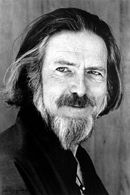Alan Wilson Watts, a renowned British philosopher, devoted his life to interpreting and popularizing Eastern philosophy for a Western audience. Born on January 6, 1915, in Chislehurst, England, Watts' journey took him to the United States in 1938, where he began his Zen training in New York.
Pursuing a career in theology, Watts attended Seabury-Western Theological Seminary, earning a master's degree in the subject. He became an Episcopal priest in 1945, only to leave the ministry in 1950 and relocate to California. Watts joined the faculty of the American Academy of Asian Studies, marking the beginning of his academic and philosophical pursuits.
Watts' work as a volunteer programmer at KPFA, a Pacifica Radio station in Berkeley, allowed him to share his knowledge with a large following in the San Francisco Bay Area. He wrote over 25 books and articles, exploring the intersection of Eastern and Western religion. One of his most notable works, "The Way of Zen" (1957),introduced Buddhism to a new generation, while "Psychotherapy East and West" (1961) proposed a groundbreaking idea: that Buddhism could be viewed as a form of psychotherapy rather than a religion.
Watts' literary prowess is evident in "Nature, Man and Woman" (1958),which he considered his magnum opus. He also explored human consciousness in "The New Alchemy" (1958) and "The Joyous Cosmology" (1962). Throughout his life, Watts' writings and recorded talks continue to captivate audiences with their profound and galvanizing lucidity.
As his life drew to a close, Watts divided his time between a houseboat in Sausalito and a cabin on Mount Tamalpais, where he continued to write and share his wisdom with the world.

















